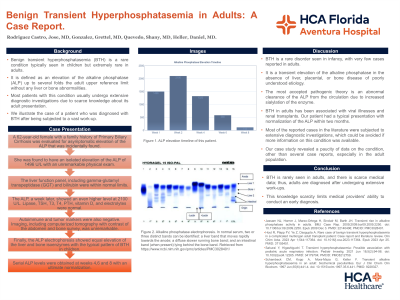Monday Poster Session
Category: Liver
P3008 - Benign Transient Hyperphosphatasemia in Adults: A Case Report
Monday, October 28, 2024
10:30 AM - 4:00 PM ET
Location: Exhibit Hall E

Has Audio

Jose L. Rodriguez Castro, MD
Aventura Hospital
Aventura, FL
Presenting Author(s)
Jose L. Rodriguez Castro, MD1, Grettel Gonzalez Garcia, MD2, Daniel Heller, MD1
1Aventura Hospital, Aventura, FL; 2Newark Beth Israel Medical Center, Newark, NJ
Introduction: Benign transient hyperphosphatasemia (BTH) is a rare condition typically seen in children but extremely rare in adults. It is defined as an elevation of the alkaline phosphatase (ALP) up to several folds the adult upper reference limit without any liver or bone abnormalities. Most patients with this condition usually undergo extensive diagnostic investigations due to scarce knowledge about its adult presentation. We illustrate the case of a patient who was diagnosed with BTH after being subjected to a vast work-up.
Case Description/Methods: Our patient is a 62-year-old female who was evaluated for asymptomatic elevation of the ALP. She has a family history of primary biliary cirrhosis. She was found to have an isolated elevation of the ALP of 1496 U/L with an unremarkable physical exam. The liver function panel, including gamma-glutamyl transpeptidase (GGT) and bilirubin, were within normal limits. The ALP, a week later, showed an even higher level at 2100 U/L. Lipase, TSH, T3, T4, PTH, vitamin D, and electrolytes were normal. Autoimmune and tumor markers were also negative. Imaging, including computerized tomography with contrast of the abdomen and bone survey, were unremarkable. Finally, the ALP electrophoresis showed equal elevation of the liver and bone isoenzymes with the typical pattern of BTH in children. Serial ALP levels were obtained at weeks 4,6 and 8 with an ultimate normalization.
Discussion: BTH is a rare disorder seen in infancy; very few cases have been reported in adults. It is a transient elevation of the alkaline phosphatase in the absence of liver, placental, or bone disease of poorly understood etiology. The most accepted pathogenic theory is an abnormal clearance of the ALP from the circulation due to increased sialylation of the enzyme. BTH in adults has been associated with viral illnesses and renal transplants. Our patient had a typical presentation with normalization of the ALP within two months. Most of the reported cases in the literature were subjected to extensive diagnostic investigations, which could be avoided if more information on this condition was available. Our case study revealed a paucity of data on the condition, other than several case reports, especially in the adult population. This knowledge scarcity limits medical providers' ability to make an early diagnosis.
Disclosures:
Jose L. Rodriguez Castro, MD1, Grettel Gonzalez Garcia, MD2, Daniel Heller, MD1. P3008 - Benign Transient Hyperphosphatasemia in Adults: A Case Report, ACG 2024 Annual Scientific Meeting Abstracts. Philadelphia, PA: American College of Gastroenterology.
1Aventura Hospital, Aventura, FL; 2Newark Beth Israel Medical Center, Newark, NJ
Introduction: Benign transient hyperphosphatasemia (BTH) is a rare condition typically seen in children but extremely rare in adults. It is defined as an elevation of the alkaline phosphatase (ALP) up to several folds the adult upper reference limit without any liver or bone abnormalities. Most patients with this condition usually undergo extensive diagnostic investigations due to scarce knowledge about its adult presentation. We illustrate the case of a patient who was diagnosed with BTH after being subjected to a vast work-up.
Case Description/Methods: Our patient is a 62-year-old female who was evaluated for asymptomatic elevation of the ALP. She has a family history of primary biliary cirrhosis. She was found to have an isolated elevation of the ALP of 1496 U/L with an unremarkable physical exam. The liver function panel, including gamma-glutamyl transpeptidase (GGT) and bilirubin, were within normal limits. The ALP, a week later, showed an even higher level at 2100 U/L. Lipase, TSH, T3, T4, PTH, vitamin D, and electrolytes were normal. Autoimmune and tumor markers were also negative. Imaging, including computerized tomography with contrast of the abdomen and bone survey, were unremarkable. Finally, the ALP electrophoresis showed equal elevation of the liver and bone isoenzymes with the typical pattern of BTH in children. Serial ALP levels were obtained at weeks 4,6 and 8 with an ultimate normalization.
Discussion: BTH is a rare disorder seen in infancy; very few cases have been reported in adults. It is a transient elevation of the alkaline phosphatase in the absence of liver, placental, or bone disease of poorly understood etiology. The most accepted pathogenic theory is an abnormal clearance of the ALP from the circulation due to increased sialylation of the enzyme. BTH in adults has been associated with viral illnesses and renal transplants. Our patient had a typical presentation with normalization of the ALP within two months. Most of the reported cases in the literature were subjected to extensive diagnostic investigations, which could be avoided if more information on this condition was available. Our case study revealed a paucity of data on the condition, other than several case reports, especially in the adult population. This knowledge scarcity limits medical providers' ability to make an early diagnosis.
Disclosures:
Jose Rodriguez Castro indicated no relevant financial relationships.
Grettel Gonzalez Garcia indicated no relevant financial relationships.
Daniel Heller indicated no relevant financial relationships.
Jose L. Rodriguez Castro, MD1, Grettel Gonzalez Garcia, MD2, Daniel Heller, MD1. P3008 - Benign Transient Hyperphosphatasemia in Adults: A Case Report, ACG 2024 Annual Scientific Meeting Abstracts. Philadelphia, PA: American College of Gastroenterology.
